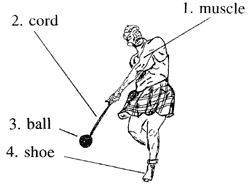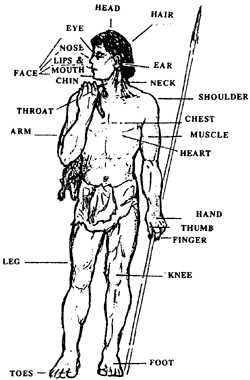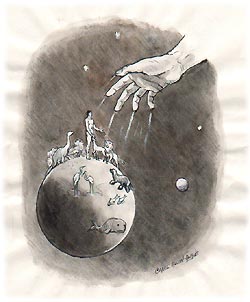Unit 3: The 15 Other Verbs
Los 15 Otros Verbos
Pictured Words
Palabras Representadas
New Words
Nuevas Palabras

| 1. muscle
músculo |
| 2. cord
cuerda |
| 3. ball
bola |
| 4. shoe
zapato |
Nouns
Sustantivos
cosa
Adjectives
Adjetivos
oscuro - luz
grande - pequeño
bueno - cruel
dulce - amargo
Structure Words
Palabras De la Estructura
en
tenga
pueda
voluntad
venido - vaya
subsistencia
puesto - toma
hacer
deje
opinión
consiga - la elasticidad
haga
vea
Sayings
Refranes
This is a man.
Esto es un hombre.
He is strong.
Él es fuerte.
What is your name please?
¿Cuál es su nombre por favor?
What is the name of this place?
¿Cuál es el nombre de este lugar?
What is that?
¿Cuál es ése?
What time is it, please?
¿Cuándo es, por favor?
Please say that again.
Diga por favor eso otra vez.
Please say it slowly.
Dígalo por favor lentamente.
Please sit down.
Siéntese por favor abajo.
The 15 Other Verbs
Los 15 Otros Verbos
A very important group of words is called verbs.
Un grupo muy importante de palabras se llama los verbos.
You have already met one of them: the verb "to be".
Usted ha resuelto ya uno de ellos: el verbo ""a ser"".
There will be 15 others and it will be easiest for you to meet them in a table which shows the way each changes in form when showing time.
Habrá 15 otros y será el más fácil que usted los resuelva en una tabla que demuestre a manera cada uno cambios en forma al demostrar tiempo.
Fortunately, none of these verbs has as many changes as does the verb "to be".
Afortunadamente, ningunos de estos verbos tienen tantos cambios al igual que es el verbo """".
Verb Table
Tabla Del Verbo
| Root
Raíz | Past
Más allá de | Present (3rdPerson)
Presente (3rdPerson) | Future
Futuro |
| put
puesto | put
puesto | put (he puts)
puesto (él pone) | will put
pondrá |
| take
tomar | took
tomó | take (he takes)
tomo (él toma) | will take
tomará |
| give
dar | gave
dió | give (he gives)
doy (él da) | will give
dará |
| get
conseguir | got
conseguió | get (he gets)
consigo (él consigue) | will get
conseguirá |
| come
venir | came
vino | come (he comes)
vengo (él viene) | will come
vendrá |
| go
ir | went
fué | go (he goes)
voy (él va) | will go
irá |
| do
hacer | did
hizo | do (he does)
hago (él hace) | will do
hará |
| have
tenga | had
tenía | have (he has)
tenga (él tiene) | will have
tendrá |
| make
haga | made
hecho | make (he makes)
haga (él hace) | will make
hará |
| keep
subsistencia | kept
guardado | keep (he keeps)
subsistencia (él guarda) | will keep
guardará |
| let
dejado | let
dejado | let (he lets)
dejado (él deja) | will let
deje |
| seem
parézcase | seemed
parecido | seem (he seems)
parézcase (él se parece) | will seem
se parecerá |
| say
opinión | said
dicho | say (he says)
opinión (él dice) | will say
dirá |
| send
envíe | sent
enviado | send (he sends)
envíe (él envía) | will send
enviará |
| see
vea | saw
sierra | see (he sees)
vea (él ve) | will see
verá |
Verb Rules
Reglas Del Verbo
There are some common qualities that make it easier to use these verbs correctly:
Hay algunas calidades comunes que hacen más fácil utilizar estos verbos correctamente:
1. The root only changes for the past time.
1. La raíz cambia solamente por el último tiempo.
Fortunately the change is the same for all persons.
El cambio es afortunadamente igual para todas las personas.
2. The change for the present time is for the 3rd person only.
2. El cambio por el actual tiempo está para la 3ro persona solamente.
An "S" is added to the root.
Un ""S"" se agrega a la raíz.
(The third person pronoun may be masculine, "he";
(el tercer pronombre de la persona puede ser masculino, ""él"
feminine, "she";
femenino, ""ella"
or neuter "it").
o neutralícelo """").
3. The future time is shown by putting "will" before the root.
3. El tiempo futuro es demostrado poniendo """" antes de la raíz.
If these Steps are taken it will be easy.
Si se toman estas medidas será fácil.

| head
cabeza |
| hair
pelo |
| face
cara |
| nose
nariz |
| lips
labios |
| mouth
boca |
| eye
ojo |
| ear
oído |
| chin
barbilla |
| neck
cuello |
| throat
garganta |
| shoulder
hombro |
| arm
brazo |
| chest
pecho |
| muscle
músculo |
| heart
corazón |
| hand
mano |
| thumb
pulgar |
| finger
dedo |
| leg
pierna |
| knee
rodilla |
| foot
pie |
| toes
dedos del pie |

The Making of the World
La fabricación del mundo
The verbs have a line beneath them:
Los verbos tienen una línea debajo de ellos:
At the first God made the heaven and the earth.
En el primer Dios hecho el cielo y la tierra.
And the earth was waste and without form;
Y la tierra era inútil y sin forma
and it was dark on the face of the deep: and the Spirit of God was moving on the face of the waters.
y era oscura en la cara del profundo: y el alcohol del dios se movía en la cara de las aguas.
And God said, Let there be light: and there was light.
Y Dios dijo, dejó allí ser luz: y había luz.
And God, looking on the light, saw that it was good: and God made a division between the light and the dark, naming the light, Day, and the dark, Night.
Y Dios, mirando en la luz, vio que era bueno: y el dios hizo una división entre el ligero y el oscuro, nombrando la luz, el día, y la obscuridad, noche.
And there was evening and there was morning, the first day.
Y había tarde y había mañana, el primer día.
And God said, Let there be a solid arch stretching over the waters, parting the waters from the waters.
Y el Dios dijo, dejó allí ser un arco sólido que estiraba sobre las aguas, dividiendo las aguas de las aguas.
And God made the arch for a division between the waters which were under the arch and those which were over it: and it was so.
Y Dios hizo el arco para una división entre las aguas que estaban debajo del arco y las que estaban sobre él: y estaba tan.
And God gave the arch the name of Heaven.
Y Dios dio a arco el nombre del cielo.
And there was evening and there was morning, the second day.
Y había tarde y había mañana, el segundo día.
And God said, Let the waters under the heaven come together in one place, and let the dry land be seen: and it was so.
Y Dios dijo, dejó las aguas bajo cielo viene junto en un lugar, y dejó la tierra seca ser visto: y estaba tan.
And God gave the dry land the name of Earth;
Y Dios dio a tierra seca el nombre de la tierra
and the waters together in their place were named Seas: and God saw that it was good.
y las aguas juntas en su lugar fueron nombradas Seas: y Dios vio que era bueno.
And God said, Let grass come up on the earth, and plants producing seed, and fruit-trees giving fruit, in which is their seed after its sort;
Y Dios dijo, dejó la hierba para venir para arriba en la tierra, y las plantas produciendo la semilla, y los fruta-a'rboles que daban la fruta, en la cual está su semilla después de su clase
and it was so.
y estaba tan.
And grass came up on the earth, and every plant producing seed of its sort, and every tree producing fruit, in which is its seed of its sort: and God saw that it was good.
Y la hierba vino para arriba en la tierra, y cada planta produciendo la semilla de su clase, y cada árbol produciendo la fruta, en la cual está su semilla de su clase: y el dios vio que era bueno.
And there was evening and there was morning, the third day.
Y había tarde y había mañana, el tercer día.
And God said, Let there be lights in the arch of heaven, for a division between the day and the night, and let them be for signs, and for marking the changes of the year, and for days and for years:
Y el Dios dijo, dejó allí ser luces en el arco del cielo, para una división entre el día y la noche, y los dejó estar para las muestras, y para marcar los cambios del año, y por días y por años:
And God made the two great lights: the greater light to be the ruler of the day, and the smaller light to be the ruler of the night: and he made the stars.
Y el Dios hizo las dos grandes luces: la mayor luz a ser la regla del día, y la luz más pequeña a ser la regla de la noche: y él hizo las estrellas.